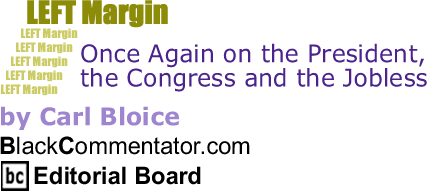
|
||||||||||||||||||||||
|
||||
 |
||||
Columnist
Paul Krugman has a problem. Well, not really. It�s us who have the
problem. He just has a provocative way of highlighting it. He�s
said it before and he repeated it again last week: What we ought
to do, we probably cannot do because it�s not in the political cards.
Why? Because while we may have a progressive majority in
the country and the more liberal of the two major parties controls
both house of Congress the political initiative is in the hands
the rightwing. �Here
in �The alternative would be policies that address the job issue more directly,� Krugman went on. �We could, for example, have New-Deal-style employment programs. Perhaps such a thing is politically impossible now - Glenn Beck would describe anything like the Works Progress Administration as a plan to recruit pro-Obama brownshirts - but we should note, for the record, that at their peak, the W.P.A. and the Civilian Conservation Corps employed millions of Americans, at relatively low cost to the budget.� Later in the column, he says �a large enough conventional stimulus would do the trick. But since that doesn�t seem to be in the cards, we need to talk about cheaper alternatives that address the job problem directly.� Of course, he knows that even the less effective alternatives will bring out the teabaggers and charges of - horror upon horrors - �a government-run jobs program.� Maybe the question we ought to be asking right now is: do we really have to settle for the cheaper stuff?
�And long-term unemployment inflicts long-term damage. Workers who have been out of a job for too long often find it hard to get back into the labor market even when conditions improve. And there are hidden costs, too - not least for children, who suffer physically and emotionally when their parents spend months or years unemployed.� This is not meant as criticism of the Nobel prize-winning economist. He has been one of a handful of liberals in the media crying out, Jeremiah like, about the employment crisis facing the country�s working people, like University of California professor and former Labor Secretary Robert Reich and fellow Times columnist Bob Herbert. But obviously all the columnists in the world do not a movement make. And unless an effective movement unfolds nothing really effective is going to be done. The
same day Krugman�s let-set-our-sights-a little-lower column appeared,
a similar view was expressed by Krishna Guha
�The Obama administration is penned in by the need to avoid a bond and currency market revolt against giant budget deficits,� Guha. �The idea of trading off long-term savings through entitlement reform against short-term deficits - eminently sensible in theory - has run into political limits with healthcare reform.� �This is not a counsel of despair,� writes Guha. �Extra efforts to boost small business finance could meet the test. A jobs or investment tax credit is at least worth debating seriously, as is an infrastructure development bank. But the greatest payoff could lie in efforts to deal with long-term unemployment - now, before it is too late.� One
of the problems we face is the kind of leadership we get from the
executive branch of the government. Before he left on his Asian
tour President Obama indicated he is aware of the situation and
plans to come up with some proposals to do something about it. He�s
even planning one of his summits to talk about it. We can only hope
that it purpose is not to just lay out how bad things are but to
propose bold action. However, one of the problems is who he�s taking
advice from. It�s seems clear that from �President Obama's team made it clear months ago that he will brook no talk of a �second stimulus� at a time when the first stimulus is under significant criticism - from the right, to be sure, but also from the left,� wrote Isaiah Poole on the Campaign for America�s Future website November 13. Nonetheless, the coming White House jobs summit �offers an opportunity to reset the political conversation on building an enduring recovery for the 17.5 percent of Americans who are unemployed and underemployed.� Krugman agrees. In a November 12 interview with Alison van Diggelen on Fresh Dialogues, he said, �This jobs summit can�t be an empty exercise� and that Obama �can�t come out with a proposal for $10 or $20 billion of stuff because people will view that as a joke. There has to be a significant job proposal� if it isn�t several hundred billion dollars�OK, probably it�s not going to be as big as the first stimulus bill and not going to be as big as I think it should be� But I have in mind something like $300 billion, you could do quite a lot that�s actually targeted on jobs.� �The
political right would rather focus the conversation on another number
- $12 trillion - which is what the national debt will be by early
December,� writes
Because of rising joblessness the holiday season is going to be bleak for millions of people across the land. I must admit that writing about it week after week is depressing; I feel like I�m saying the same thing over and over again. As we note, the heightened attention to the crisis, and hopefully proposals for Congressional action, the alarming jobless figures will be repeated over and over. The employment situation is dire and from all indications it is going to get worse. Yes, we need a jobs program, but that�s the easy part. The President, writes Poole, � still has significant political capital, and he can use it to build consensus around an investment economy agenda: Rebuild the nation's public commons, fuel the transition to the green economy, restore manufacturing as a critical building block of restoring middle-class prosperity. Those who have reaped the most from our economic policies should be asked to contribute the most to its continued security.� The
problem now is to make sure the ditherers in BlackCommentator.com Editorial Board member Carl Bloice
is a writer in |
||||
 |
||||
If you would like to comment on this article, please do so below. There is a 400 character limit. You do not need a FaceBook account. Your comment will be posted here on BC instantly. Thanks. Entering your email address is not mandatory. You may also choose to enter only your first name and your location.
|
||||
Thank you very much for your readership. |
||||
| Any BlackCommentator.com article may be re-printed so long as it is re-printed in its entirety and full credit given to the author and www.BlackCommentator.com. If the re-print is on the Internet we additionally request a link back to the original piece on our Website. | ||||
| |
||||
| November
19 , 2009 Issue 351 |
| Executive Editor: Bill Fletcher, Jr. |
| Managing Editor: Nancy Littlefield |
| Publisher: Peter Gamble |
| Est. April 5, 2002 |
| Printer Friendly Version in resizeable plain text format |
 |

|
 |
| |
| |
































 Krugman
notes that �these aren�t normal times. Right now, workers who lose
their jobs aren�t moving to the jobs of the future; they�re entering
the ranks of the unemployed and staying there. Long-term unemployment
is already at its highest levels since the 1930s, and it�s still
on the rise.
Krugman
notes that �these aren�t normal times. Right now, workers who lose
their jobs aren�t moving to the jobs of the future; they�re entering
the ranks of the unemployed and staying there. Long-term unemployment
is already at its highest levels since the 1930s, and it�s still
on the rise.

 Hopefully
we won�t hear much more about Obama trying to do too much at once.
Even some liberals have repeated the notion that both time and political
capital have been wasted on the healthcare debate. Yes, employment
has to move to first place on the legislative priority list but
that doesn�t mean the need for labor law reform or climate change
action should be set aside. As former Montana Governor Brian Schweitzer
put it to John King on CNN last Sunday, if the current members
of congress can�t work on more than one problem at one time we need
some new members of Congress.
Hopefully
we won�t hear much more about Obama trying to do too much at once.
Even some liberals have repeated the notion that both time and political
capital have been wasted on the healthcare debate. Yes, employment
has to move to first place on the legislative priority list but
that doesn�t mean the need for labor law reform or climate change
action should be set aside. As former Montana Governor Brian Schweitzer
put it to John King on CNN last Sunday, if the current members
of congress can�t work on more than one problem at one time we need
some new members of Congress.











